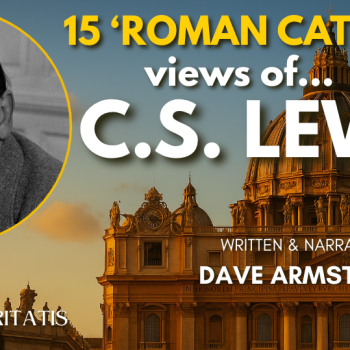
This occurred in a combox on the Reformed Protestant-dominated Green Baggins website, starting at comment #323. I responded at #330.
* * * * *
Why would anyone think in the first place that one has to be infallible to recognize and accept a source that is infallible, or any particular truth? The Bible presupposes many things, among them: 1) that we know there is a God, by, among other things, simply observing creation (Rom 1:19-21). The text doesn’t say that the person has to be flawless in comprehension or infallible or what-not. There is a thing called “faith” in the Bible, right?
Likewise, it is casually assumed that we can know truth without being incapable of espousing other erroneous beliefs. I can know that 2+2=4 with a high degree of certainty without being infallible in all math (I never took calculus or trigonometry). I can know how to wire a socket without knowing every jot and tittle of advanced electronics. I can change a water pump on a car without being a full-fledged mechanic. My knowledge was flawed and incomplete and fallible in all those cases, yet the thing I knew I knew with great certainty.
Paul expressly teaches that the Church is “the pillar and bulwark of the truth” (1 Tim 3:15). That is accepted because it is in infallible Scripture. You as Protestants believe in an infallible Scripture without having to be personally infallible. I and Catholics agree with you. I think there are many different ways that God communicates to us that Scripture is inspired revelation, apart from Church authority.
“Truth” is universally presented in Scripture as able to be known (without people having to be “infallible” in order to do so). And there was one faith and one body of truth, not hundreds, as in Protestantism:
John 8:31-32 (RSV as throughout) Jesus then said to the Jews who had believed in him, “If you continue in my word, you are truly my disciples, and you will know the truth, and the truth will make you free.”
John 16:13 When the Spirit of truth comes, he will guide you into all the truth; for he will not speak on his own authority, but whatever he hears he will speak, and he will declare to you the things that are to come.
Romans 2:8 but for those who are factious and do not obey the truth, but obey wickedness, there will be wrath and fury.
1 Corinthians 2:13 And we impart this in words not taught by human wisdom but taught by the Spirit, interpreting spiritual truths to those who possess the Spirit.
2 Corinthians 4:2 We have renounced disgraceful, underhanded ways; we refuse to practice cunning or to tamper with God’s word, but by the open statement of the truth we would commend ourselves to every man’s conscience in the sight of God.
2 Corinthians 11:10 . . . the truth of Christ is in me . . .
2 Corinthians 13:8 For we cannot do anything against the truth, but only for the truth.
Galatians 5:7 You were running well; who hindered you from obeying the truth?
2 Thessalonians 2:10-13 and with all wicked deception for those who are to perish, because they refused to love the truth and so be saved. Therefore God sends upon them a strong delusion, to make them believe what is false, so that all may be condemned who did not believe the truth but had pleasure in unrighteousness. But we are bound to give thanks to God always for you, brethren beloved by the Lord, because God chose you from the beginning to be saved, through sanctification by the Spirit and belief in the truth.
1 Timothy 2:4 who desires all men to be saved and to come to the knowledge of the truth.
1 Timothy 4:3 . . . those who believe and know the truth.
2 Timothy 1:13-14 Follow the pattern of the sound words which you have heard from me . . . guard the truth which has been entrusted to you by the Holy Spirit who dwells within us.
2 Timothy 2:25 . . . God may perhaps grant that they will repent and come to know the truth,
2 Timothy 3:7-8 who will listen to anybody and can never arrive at a knowledge of the truth. As Jannes and Jambres opposed Moses, so these men also oppose the truth, men of corrupt mind and counterfeit faith;
2 Timothy 4:4 and will turn away from listening to the truth and wander into myths.
2 Peter 1:12 Therefore I intend always to remind you of these things, though you know them and are established in the truth that you have.
1 John 2:21 I write to you, not because you do not know the truth, but because you know it, and know that no lie is of the truth.
1 John 3:19 By this we shall know that we are of the truth, and reassure our hearts before him
This was true already in the Old Covenant. For example, it was said of the Levites:
Malachi 2:6-8 True instruction was in his mouth, and no wrong was found on his lips. He walked with me in peace and uprightness, and he turned many from iniquity. For the lips of a priest should guard knowledge, and men should seek instruction from his mouth, for he is the messenger of the LORD of hosts.
Prophets routinely purported to proclaim the very “word of the LORD.” This is a much greater claim than infallibility under limited conditions. Papal infallibility is primarily a preventive, or “negative” guarantee, not positive inspiration. It is easy to argue, then, that infallibility is a far less noteworthy gift than the “revelation on the spot” that we observe in the prophets:
1 Samuel 15:10 The word of the LORD came to Samuel:
2 Samuel 23:2 The Spirit of the LORD speaks by me, his word is upon my tongue. [King David]
1 Chronicles 17:3 But that same night the word of the LORD came to Nathan,
Isaiah 38:4 Then the word of the LORD came to Isaiah:
Jeremiah 26:15 . . . the LORD sent me to you to speak all these words in your ears.
Ezekiel 33:1 The word of the LORD came to me: [“word of the LORD” appears 60 times in the Book of Ezekiel]
To the contrary: the prophets received their inspiration by the Holy Spirit (2 Chron. 24:20; Neh. 9:30; Zech. 7:12). The Holy Spirit is now given to all Christians (Jn. 15:26; 1 Cor. 3:16), so it is perfectly possible and plausible that an even greater measure of the Holy Spirit would be given to leaders of the Church who have the responsibility to teach, since James wrote: “Let not many of you become teachers, my brethren, for you know that we who teach shall be judged with greater strictness” (Jas. 3:1). The disciples were reassured by Jesus: “When the Spirit of truth comes, he will guide you into all the truth” (Jn. 16:13; cf. 8:32), so surely it makes sense that shepherds of the Christian flock would be given an extra measure of protection in order to better fulfill their duties.
Perhaps the clearest biblical proof of the infallible authority of the Church is the Jerusalem Council (Acts 15:6-30), and its authoritative pronouncement, binding on all Christians:
Acts 15:29-30 For it has seemed good to the Holy Spirit and to us to lay upon you no greater burden than these necessary things: that you abstain from what has been sacrificed to idols and from blood and from what is strangled and from unchastity.
In the next chapter, we learn that Paul, Timothy, and Silas traveled around “through the cities” and “delivered to them for observance the decisions which had been reached by the apostles and elders who were at Jerusalem” (Acts 16:4). This is binding Church authority – with the sanction of the Holy Spirit Himself -, and an explicit biblical proof of the gift of infallibility that the Catholic Church claims for itself when it assembles in a council.
St. Paul told us to imitate him (e.g., 2 Thess. 3:9). And he went around proclaiming decrees of the Church. No one was at liberty to disobey these decrees on the grounds of conscience, or to declare by “private judgment” that they were in error (per Luther).
It’s a non-issue; completely irrelevant. This is a mentality of reducing Christianity to mere philosophy rather than a religion and spiritual outlook that requires faith and incorporates innate and intuitive knowledge that God grants to us through the Holy Spirit and His grace. We can know the truth. We don’t need to be infallible to do so. This sort of thinking is post-Enlightenment hyper-rationalism. It certainly isn’t a biblical outlook.
But with regard to the canon, the fact that we can possibly arrive at truth (just as St. Athanasius did by being the first to list all 27 New Testament books in 367: some 330 years after Christ) did not guarantee that the collective of early Christians came to a consensus. Therefore, Church authority (sanctioned by God and the Bible) was needed to make a proclamation that would settle the issue, just as other doctrines (notably trinitarianism and Christology) were hammered out by the early Church, with authoritative decrees handed down.
***
(originally from 6-8-10)
Photo credit: Image created on 10-3-09 [Pexels.com / CC0 license]
***
















